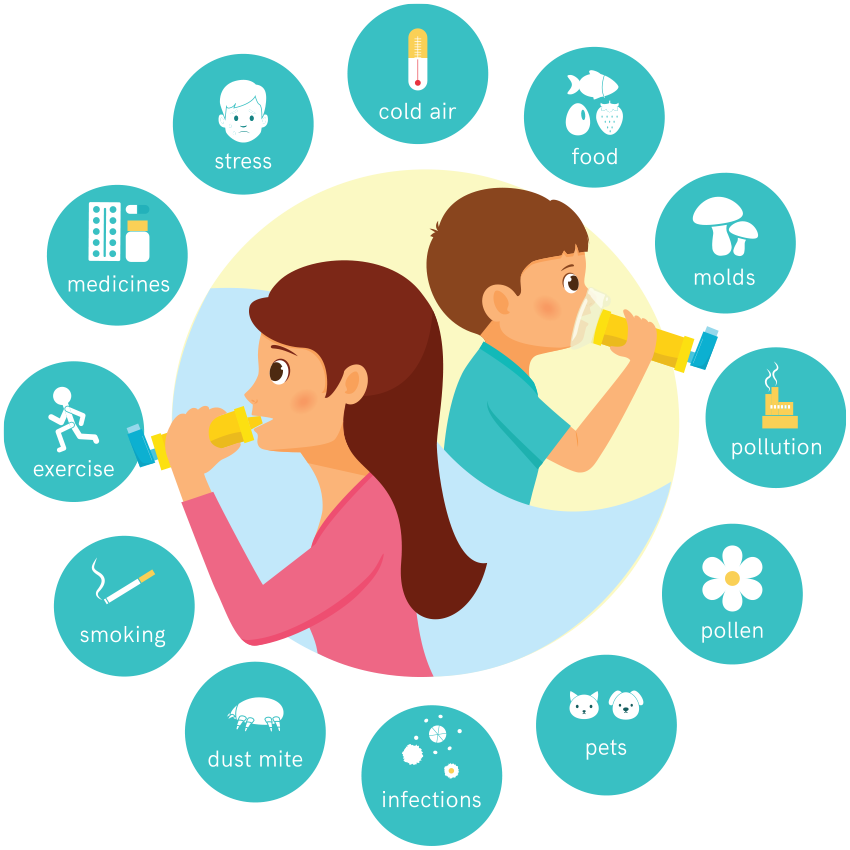Understanding Asthma: The Science Behind Symptoms
Asthma is a condition affecting the airways in your lungs. When someone has asthma, these airways become narrow and swell. This can cause wheezing, coughing, and trouble breathing. These asthma disease symptoms often appear or worsen due to specific triggers. Recognizing and managing these can help reduce discomfort and prevent worsening conditions.
The Crucial Role of Triggers in Asthma
Triggers play a significant role in asthma. They can cause or worsen asthma symptoms, making breathing much tougher. Every individual reacts differently to various triggers. Some may have a reaction to pollen, while others may find dust to be their main concern. Understanding one’s personal triggers can be the key to controlling asthma disease symptoms effectively.
Breaking Down Common Asthma Triggers
Indoor Allergens and Irritants
Indoor allergens are a frequent cause of asthma symptoms. Dust mites, tiny bugs found most commonly in homes, are a big problem. Mold can grow in damp areas and release spores that lead to wheezing. Pet dander from cats and dogs can also be a trigger. In urban areas, cockroaches and other pests can increase the risk for asthma. By maintaining a clean home and reducing moisture, you can limit these triggers.
Outdoor Triggers and Environmental Factors
Outdoor air quality greatly influences asthma symptoms. Pollutants such as exhaust fumes and industrial emissions can trigger wheezing and other symptoms. Seasonal changes can also affect asthma. Pollen from trees, grasses, and flowers is common in spring and summer, worsening asthma. Getting familiar with air quality reports can help plan activities and avoid being outside when pollutants are high.
Lifestyle Contributors to Asthma Severity
Certain lifestyle factors can make asthma symptoms worse. Smoking or being around secondhand smoke can irritate the airways. Strong odors from perfumes or cleaning agents can also be problematic. Reducing exposure to these factors can help lessen asthma symptoms and make breathing easier for people affected.
Non-Allergic Triggers of Asthma Symptoms
Not all triggers are allergens. Physical activity can sometimes cause asthma symptoms, particularly in cold weather. Viruses and infections, like colds, can make asthma worse. Emotional triggers, like stress or intense feelings, can also affect breathing. Being aware of these non-allergic triggers can help you take preventive steps and find effective wheeze treatments when needed.
Genetic and Environmental Influence: Who’s Most at Risk?
Both genetics and environment can affect asthma risks. If you have family members with asthma, you might be more likely to develop it. The environment, including exposure to allergens and irritants, also plays a part. Allergic reactions often connect with immune system responses, impacting who might develop asthma and at what severity.
Living with Asthma: Real-Life Triggers Illustrated
Consider someone living in a city with high pollution levels. They might experience more asthma symptoms during heavy traffic times due to higher levels of smog. Another person might find their symptoms worsening during stressful periods at work or school. Recognizing these scenarios shows the importance of identifying personal triggers and managing them effectively to reduce asthma’s impact on daily life.
Taking Control: Strategies to Manage Asthma Triggers
Here are some strategies to manage asthma triggers: – Identify personal triggers and note when symptoms worsen. – Avoid known triggers as much as possible. – Work with healthcare providers to create a personalized asthma action plan. Taking control helps reduce asthma disease causes from daily life, improving comfort and breathing.
Conclusion: Empowering Asthma Patients through Knowledge
Understanding asthma symptoms and their causes can be complicated. However, knowledge is powerful in improving life quality. By working with healthcare providers, patients can develop plans tailored to their specific needs. With better understanding, asthma sufferers can lead more comfortable and fulfilling lives.
Further Resources for Asthma Management
For more help, trusted sources include the Mayo Clinic, NIH, and AAFA. These provide valuable information and support for those with asthma.


